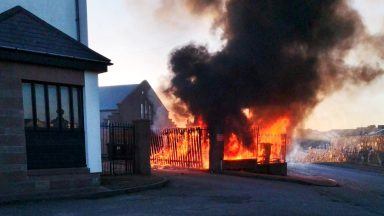Almost 190 roles have been made redundant at Robert Gordon University (RGU) as the institution continues to tackle financial pressures.
The job losses come as members of the EIS union plan to take further strike action on Thursday over the continued threat of compulsory redundancies.
Last November, RGU said that around 135 jobs were at risk due to significant financial challenges.
On Wednesday, it was confirmed that 188 jobs have now gone, with the majority through voluntary redundancy.
However, around 18 staff members lost their jobs through compulsory redundancy.
The EIS union says it has been left with no alternative but to take further strike action following walkouts in April and May.
They say the job losses are short-sighted and will only increase the workload on remaining staff.
Elsewhere, the University of the West of Scotland will also take strike action on Thursday over potential job losses, as the institution looks to save millions of pounds.
Andrea Bradley, EIS general secretary, said: “Our members are resolute in their fight to defend their jobs and protect the quality of education at RGU and UWS.
“Staff are being forced to take strike action as neither university has made any attempt to resolve their respective disputes, instead deciding to push forward with plans to make staff redundant.
‘‘These job losses will no doubt have a detrimental impact on local communities, the students who study at these institutions and the colleagues who remain after staff have left or been dismissed.
“Both universities have failed to provide a no compulsory redundancy guarantee, and our members have been left with no choice but to take a stand by striking.”
Robert Gordon University said they have a continuing commitment to avoiding and minimising, where possible, any compulsory redundancies at the institution.
A spokesperson for Robert Gordon University said: “We have a continuing commitment to avoiding and minimising, wherever possible, any compulsory redundancies at the university.
“The redundancy processes associated with our finance transformation project have now concluded, and the vast majority of affected colleagues have left the university. Most chose to leave voluntarily, with circa 10% of the 188 staff that have left being subject to compulsory redundancy.
“The university is continually evolving to meet the needs of our students, staff, and the wider sector. This means we must remain agile and responsive to changing circumstances, which, like any organisation, may involve further adjustments over time. Any such changes will be approached with care, transparency, and a commitment to minimising impact, guided by our shared goal of long-term sustainability and success.”
A UWS spokesperson said: “UWS remains committed to avoiding compulsory redundancies.
“As EIS colleagues know, a voluntary severance scheme is open, and it is hoped that this approach will avoid the need for compulsory redundancy. We remain in an ongoing consultation process with our recognised trade unions. Our approach has been transparent from the outset and our position regarding compulsory redundancies has remain unchanged.
“UWS has seen a significant reduction in funded places from the Scottish Funding Council and our plan for a change in the academic workforce aligns with that reduction in funding. Since 2022/23, the overall funded places have reduced from 12,735.3 to 10,850 for the coming year; a fall of more than 1,800 places. The challenge facing UWS is not unique, and throughout the process we have focused on ensuring we continue to deliver an excellent student experience and enhanced graduate outcomes – it is a matter of significant regret that the planned industrial action is highly likely to have a detrimental impact on our new and continuing students as they start a new academic year.”
Follow STV News on WhatsApp
Scan the QR code on your mobile device for all the latest news from around the country






























